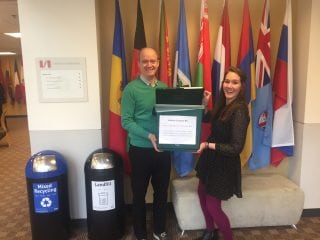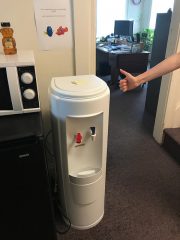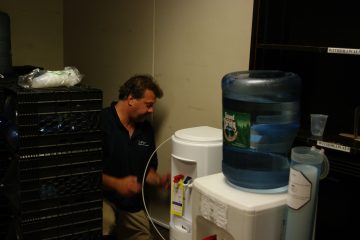Eco-Ambassadors at Work
At Tufts, staff members from many offices have worked to switch from wasteful and expensive water bottle dispensers to water filtration systems to minimize waste and encourage their coworkers to be more aware of their offices impacts on the environment. Other Eco-Ambassadors have worked to increase frequency of composting across campus.

Dan Birdsall and Molly Haragan with Fletcher’s new compost bin.
Composting in Fletcher’s Hall of Flags
Dan Birdsall, the associate director of the Office of Admissions and Financial Aid at the Fletcher School, applied for an Eco-Ambassador grant to purchase a new compost bin for the Hall of Flags. Molly Haragan, a 2nd year Master of Arts in Law and Diplomacy candidate notified Dan that a significant amount of food is consumed in the Hall of Flags, and that food leftover from student-organized events are often left there.
Previously, much of the food waste from the Hall of Flags often ended up in the garbage can rather than being transported to the compost bin at the Mugar Café. As a result, an additional compost bin at this location has significantly helped reduce food waste that will go directly to landfills. “Composting is now the obvious and easy option there,” Dan explains.
Water filter installations across campus
During spring 2017, Erin Coutts, the Communications Specialist at the Global Development and Environment Institute (GDAE), applied for a grant to install a water filtration system to replace and discontinue the use of a Poland Springs water bottle cooler in her office. There is no kitchen sink in the GDAE office, so there was no place they could fit a reusable water bottle under!

Erin Coutts happy to use the new water filtration system at GDAE.
With its new water filtration system, GDAE is one of many offices that have been able to use Eco-Ambassador grants to supplement the cost of making this simple switch.
In the fall of 2008, Susan Storm and Elizabeth DeWan from the Office of Institutional Research & Evaluation wanted to stop using bottled water and the water dispenser in the Office of Institutional Research & Evaluation. Storm and DeWan set out to compare water quality testings of tap water and filtered tap water, compare costs of buying bottled water vs. buying & maintaining filters and periodic water quality testing, and create a template for other similarly situated offices on-campus to use. They helped to set the building blocks for many other offices to make this transition.

Tisch Library’s Green Team installs the new water filtration system to replace their 5-gallon water bottle dispenser.
In the spring of 2014, Lara Shew at the Office of Continuing Education at the Tufts University School of Medicine applied for an Eco-Ambassador grant to switch her office to a water filtration system because
“It has been recognized that using the Poland Spring water dispenser incurs use of gas in the delivery of the jugs and other natural resources to clean and reuse the jugs, in addition to the initial resources used to obtain the water, manufacture and fill the jugs for distribution to a customer base. Additionally, the heavy jugs pose a challenge for the employees in our office as many of them are not comfortable replacing the heavy jug when empty, sometimes resulting in individuals purchasing bottled water outside of the office.”
That same spring, Rachel Brown from The Fletcher School applied for a grant to support retrofitting the school’s water fountains to make filling reusable water bottles easier with gooseneck bottle filling stations.